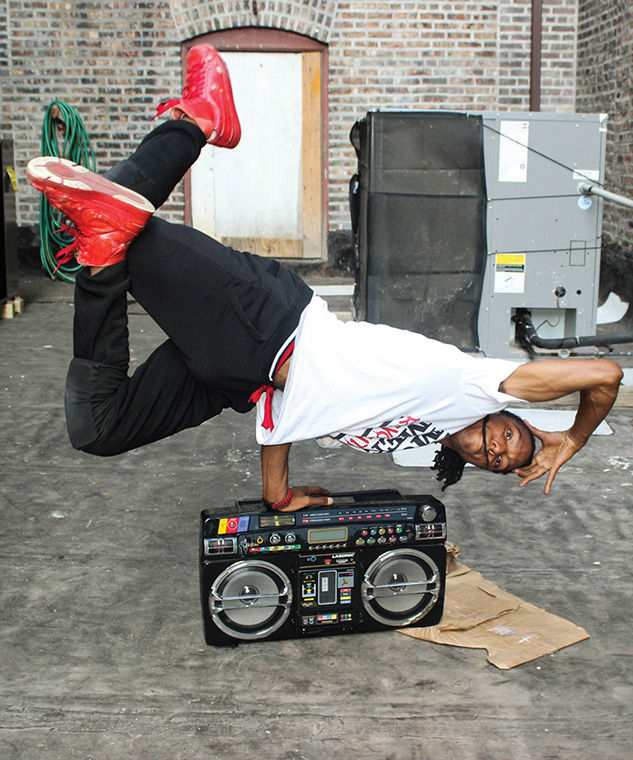Notable Native Monternez Rezell
Monternez Rezell
October 26, 2015
Hip-hop artist Monternez Rezell DJs, break dances and, for the last four months, has taught hip-hop dance at the Millennium Dance Complex Chicago. A native Chicagoan, Rezell said he knew he wanted to perform since he was 4 years old.
Rezell grew up in the South Shore area of Chicago. He attended Eastern Illinois University to study physical therapy and said he loved college because he enjoys learning. While attending college, there was only a girls hip-hop team, so he helped create Eastern’s first coed hip-hop team.
Rezell said he loves working with his younger students because he admires their tenacity and the look of elation on their faces when they accomplish their goals, adding that he hopes to pass down his passion for hip-hop to ensure the culture lives on.
The Chronicle spoke with Rezell about being a hip-hop artist in Chicago, working with Millennium Dance Complex and pursuing a career in dance.
THE CHRONICLE: How did you start dancing?
MONTERNEZ REZELL: My interest in hip-hop began after I saw my older brother do a headspin on our porch. That was the first time I had seen anyone break-dance in person, and at the time I was only 4 years old, but that was enough to spark my interest. When I was 8 or 9 years old, and MC Hammer, Michael Jackson and James Brown were on every music channel, I would run to the kitchen to practice what I saw. The combination of the movie “Breakin’,” my older brother and seeing those artists on television was enough to make me want to practice dance every day. Another influence was my mom and aunt. They sang in the church choir, so I knew performing was a part of us and something I had to be a part of.
How does Millennium Dance Complex Chicago interact with its community?
Any studio doing positive things for the community gives [students] an outlet to express themselves, especially if [they] have an instructor who is willing to share their knowledge. You want that raw talent to thrive and come to life because you are working with artists and other good people who are challenging, motivating and teaching you [to] build your foundation and dance vocabulary.
What are some of the challenges of your job?
The most difficult part is finding everyone’s way of communicating. Some people may understand a certain movement without me saying anything; some students have to be taught step by step and some learn through repetition. I’m always trying to figure out how each of my students learn[s] and remember[s] movements.
What is most rewarding about your job?
The most rewarding part is when you’re working with—I call them my babies—my students who are 6 to 8 years old and just seeing the passion they have for it and they absorb information like a sponge. The speed and rate at which they learn is amazing, and it is so rewarding working with students like that. To see how elated they are when they have a breakthrough and to see that excitement. To see the fact that they keep trying and never give up no matter how many times they have to try-—they will not stop until they get it—that’s the best part of be[ing] a teacher, to share your knowledge with someone else no matter what age they are and that’s the fulfillment that you get out of it. If I want to pass down knowledge I have, I’m going to teach it to someone else. That’s how culture moves on.
What advice do you have for students pursuing dance?
I work with a lot of college age students who are dance or music majors and their parents are discouraging them from being a dance major and saying that they cannot make a life out of dance, or other negative things that could kill dreams. I say you can’t listen to that. Whether you are currently a dance major or thinking about becoming [one], you have to make decisions that are going to make you happy. No matter what is going on, and no matter what anyone is saying about your career, you make your career happen. People from the outside looking in have no right to tell me I can’t make a living being a performer. Especially if all they’ve ever done is work a 9–5 their whole life, they can’t speak because they don’t have knowledge about what I’m pursuing. Everyone’s success story is different. Some people might graduate college with a dance degree and get hired to dance for the Joffrey Ballet for the rest of their life. Someone else may graduate and audition four times in a row and they don’t get the job until that fourth time. Everyone’s story is different, but no matter what your timeline is, never give up. If you believe it, you can achieve it. Plenty of people have proven that being an artist is both rewarding and can pay the bills.







